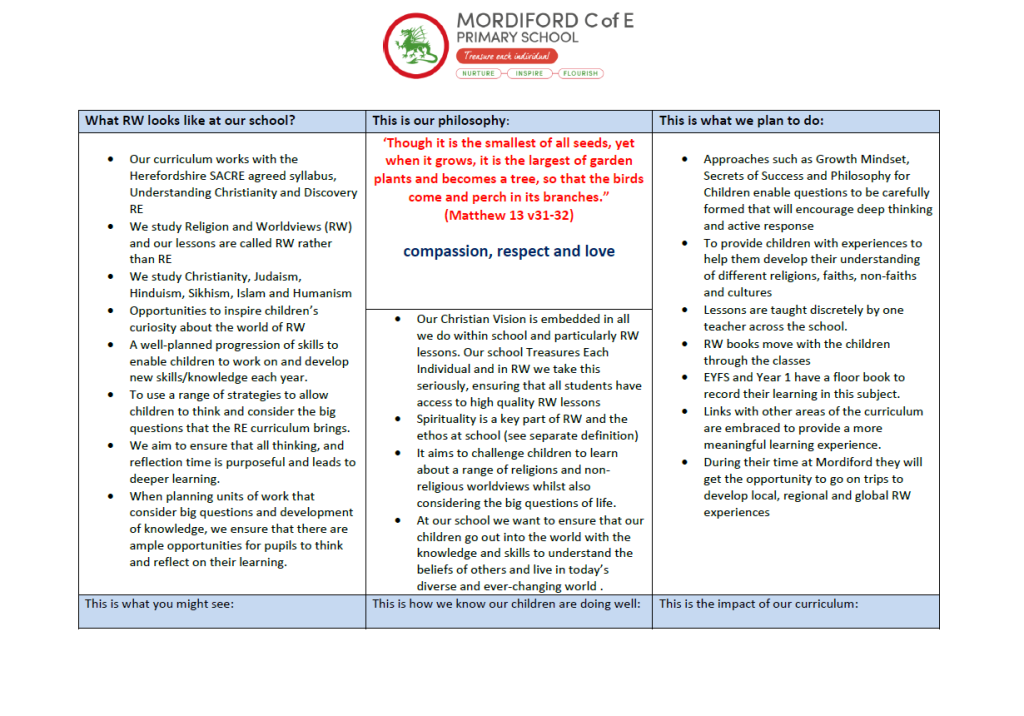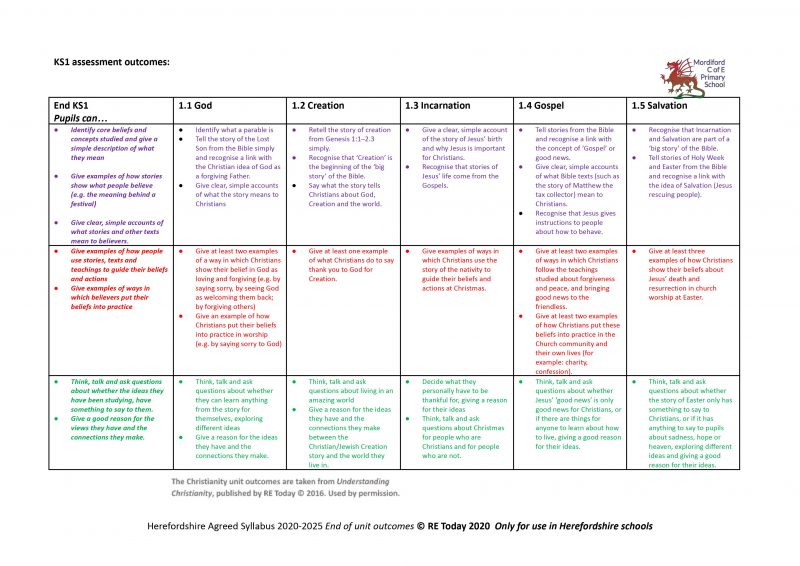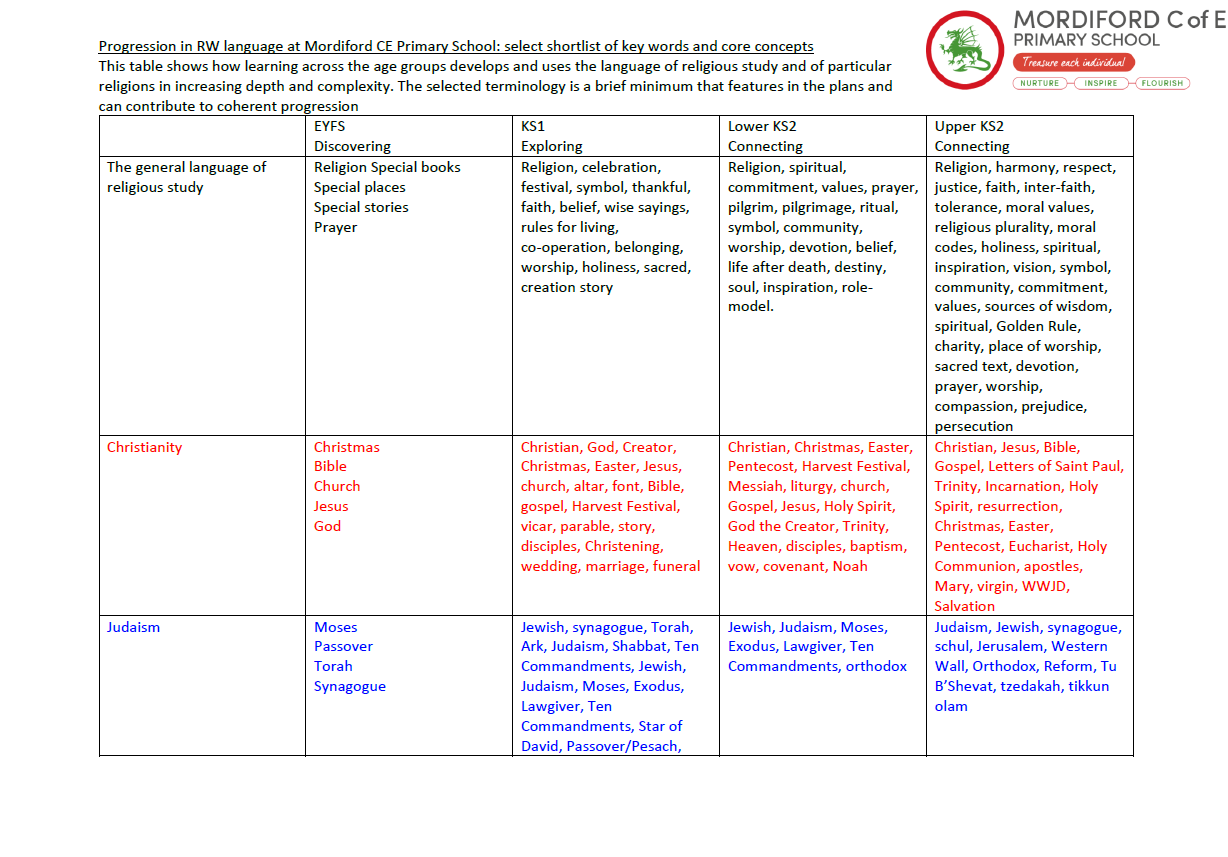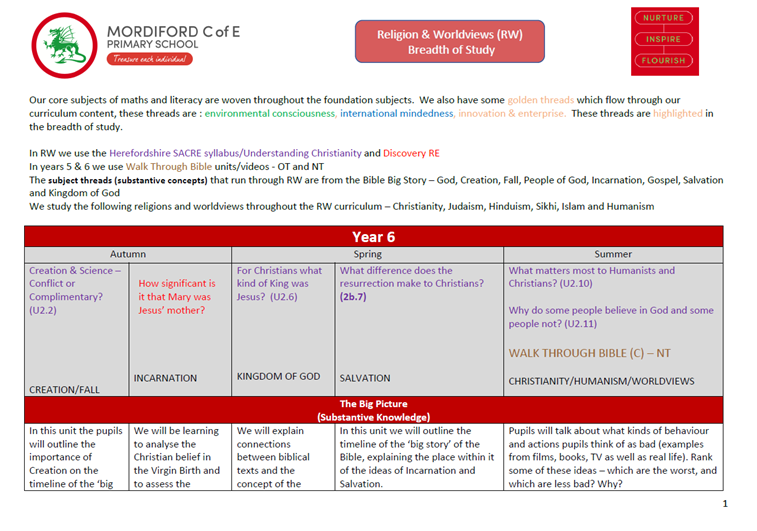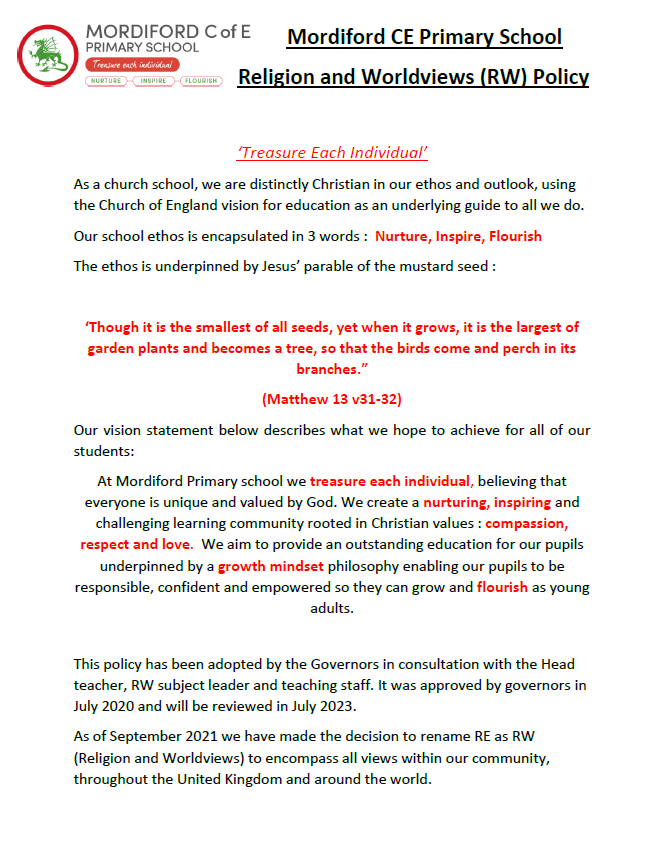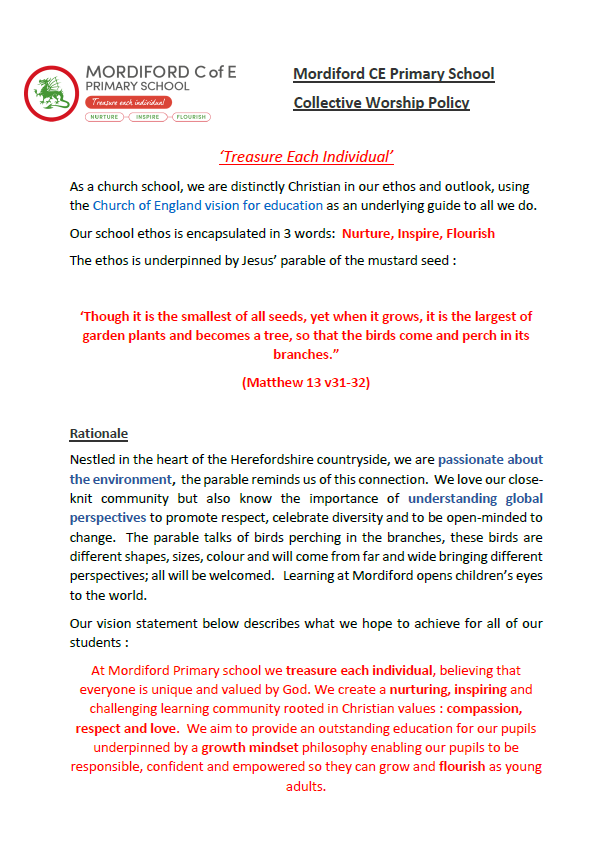 People of different religions and cultures live side by side in almost every part of the world, and most of us have overlapping identities which unite us with very different groups. We can love what we are, without hating what – and who – we are not. We can thrive in our own tradition, even as we learn from others, and come to respect their teachings.’ Kofi Annan
People of different religions and cultures live side by side in almost every part of the world, and most of us have overlapping identities which unite us with very different groups. We can love what we are, without hating what – and who – we are not. We can thrive in our own tradition, even as we learn from others, and come to respect their teachings.’ Kofi Annan
‘Like the bee gathering honey from different flowers, the wise person accepts the essence of different scriptures and sees only the good on all religions’ Mahatma Ghandi
Intent – What Do We Aspire for Our Children in Religion & Worldviews (RW)?
At Mordiford C of E Primary School, we believe that a high-quality religious education will help pupils’ gain a coherent knowledge and understanding, where they can articulate clearly and confidently their personal beliefs, ideas, values and experiences.
Our RW curriculum is designed to engage and enthuse learners. We believe that it is an essential area of study which ensures that children are well prepared for life in a world where there are a multitude of viewpoints. We enable the children to make their own informed decisions and to have the confidence to voice their views. It is a subject for all pupils, whatever their own family background and personal beliefs and practices.
We aim to develop pupils’ understanding of world faiths and other beliefs by exploring their commonality and diversity. There is both depth and breadth of study. The RW curriculum is also about ‘belonging’. It aims to nurture pupils’ awareness of diversity as well as sensitivity to the questions and challenges that different views and cultures can present. We all share a common humanity, and we share our view of the world with an understanding of others’ views.
We want our children to enjoy RW and develop resilient responses to misunderstandings, stereotyping and division. We want to offer the children a place where difficult or ‘risky’ questions can be tackled within a safe but challenging context.
Implementation – How is the curriculum for Religion & Worldviews organised?
Religion & Worldviews at Mordiford is a key player in engendering knowledge and understanding however, does not teach children to passively accept, but rather encourages evaluation and critical thinking, equipping them to consider beliefs and positions they encounter. Progression is evident through building upon the pupil’s prior knowledge, allowing them to follow the steps of engaging and investigating the different religions, leading to the process of evaluating and expressing to ensure understanding and progress is made.
We aim to provide our children with ‘religious literacy’ where they will develop their knowledge and understanding of Christianity, other religious traditions and world views and explore their responses to life’s challenges. This gives pupils the knowledge and skills to flourish both within their own community and as members of a diverse and global society.
We shall help our pupils prepare for their future by:
- Developing awareness of the fundamental questions raised by human experiences, and of how religious teachings can relate to them.
- Responding to such questions by referring to the teachings and practices of religions and other belief systems, relating them to their own understanding and experience.
- Reflecting on their own beliefs, values and experiences in the light of their study.
At Mordiford Religion & Worldviews is taught in-line with the procedures and guidelines laid down by Herefordshire locally agreed syllabus, Understanding Christianity and guidelines from the National Curriculum and other faith/non-faith worldviews. Staff also use a wide range of other resources to supplement and enhance their teaching. Each unit is underpinned by rich substantive knowledge, deep thinking key questions and ambitious vocabulary.
Our RW curriculum reflects teachers’ careful thought about what is to be taught, the rationale for it, the sequencing of learning and the relationships between the forms of knowledge. Each unit of work (in 6 half term blocks per year group) has an emphasis on religious enquiry where children investigate a faith/non-faith overarching question.
RW is a statutory subject for all pupils in all year groups and is taught in clearly identifiable timetabled lessons.
However, in consultation with the headteacher/subject lead, parents have right to withdraw from all or some RW lessons.
EYFS
36 hours per year (e.g. 50 minutes a week or some short sessions implemented through continuous provision)
Activities should be specific planned activities, but also use unplanned opportunities as they arise. Within EYFS, work is recorded in a class floor book.
KS1
36 hours per year – taught on a weekly basis.
The key worldviews studied, in depth, in this key stage are Christianity, Judaism. However, we do introduce concepts from other worldviews too.
KS2
45 hours per year – taught on a weekly basis.
The key worldviews studied, in depth, in this key stage are Christianity, Hinduism (Y3), Sikhi (Y4), Islam (Y5) and Humanism (Y6).
We also have x2 blocks of 5 weeks of Walk Through Bible (OT and NT) with a visiting teacher.
In both KS1 and KS2 pupils have a specific RW book which is passed up from class to class.
To ensure coverage, depth and balance in the RW curriculum, the subject leader has provided a range of planning materials:
- Long term plan – The long-term plan gives details the substantive and disciplinary knowledge to be taught for each half term/enquiry question. Both substantive and disciplinary concepts are threaded throughout the curriculum, so they are constantly revisited throughout KS1 and KS2.
- Our substantive concepts are: from Understanding Christianity – Bible Big Story – God, Creation, Fall, People of God, Incarnation, Gospel, Salvation and Kingdom of God.
- Key religions & worldviews which thread throughout the RW curriculum – Christianity, Judaism, Hinduism, Sikhi, Islam and Humanism.
- Medium term plans/knowledge organisers Details the substantive ‘sticky’ knowledge and sequence of lessons for each topic.
- Progression document Details the progression of skills and knowledge and vocabulary we expect the children to make through their time at Mordiford. The progression document details progression from EYFS all the way through to Year 6.
- Visits to places of worship, and visitors representing different religions provide a variety of first-hand experiences for our children, to spark their interest and relate new learning to their own experience.
Collective Worship is largely Christian based, but not exclusively. Children have daily opportunity to come together as a school community, whether in class or during whole school worship. In these, we discuss values, reflect upon our actions and develop an understanding of what is happening in the world around us. In addition, during these times children have the opportunity to celebrate their achievements both in and out of school, to be congratulated by their school family. Our classes, Worship Crew and local vicar also lead worship throughout the year. Worship is not part of our timetabled RW lessons.
Our Curriculum in Early Years:
Children in EYFS should encounter religious and non-religious worldviews through special people, books, times, places and objects and by visiting places of worship. They should listen to and talk about stories. Children can be introduced to subject-specific words and use all their senses to explore beliefs, practices and forms of expression. They ask questions and reflect on their own feelings and experiences. They use their imagination and curiosity to develop their appreciation of, and wonder at, the world in which they live.
Our curriculum is organised so children in reception meet the aims of EYFS framework. Links to the ELG’s and RW can be found in the Herefordshire SACRE syllabus.
Impact – How do we monitor our Religion & Worldviews curriculum?
We assess children’s work in RW by making informal judgements as we observe them during lessons, using cold tasks, where appropriate, to recap prior learning and with the use of strategies such as, ‘quick quizzes’ for assessment of fact retrieval. We mark a piece of work once it has been completed, often with the pupil, and we comment, as necessary. An effort assessment is recorded in the pupils’ mid-year and end of year reports.
There is a monitoring cycle in place which evaluates RW teaching and learning, outcomes and pupil voice. These outcomes feed into action planning to continually evaluate and improve our teaching and learning in RW.
Monitoring and evaluation could include:
- A review of learning in books
- Lesson observations
- Learning walks
- Use of display
- Evaluation of the impact of staff professional development
- A review of medium-term planning
- Talking to pupils about learning in RW

